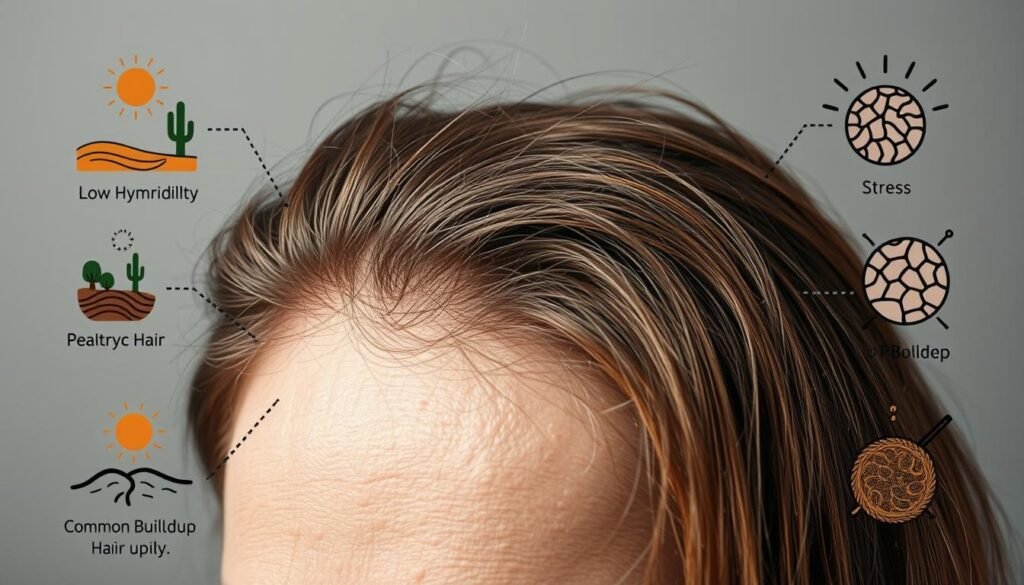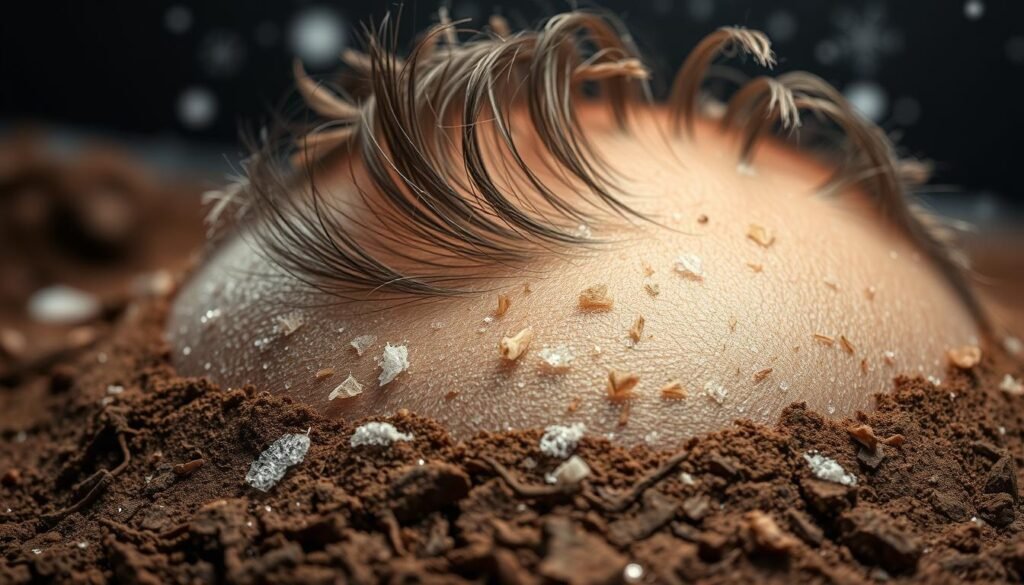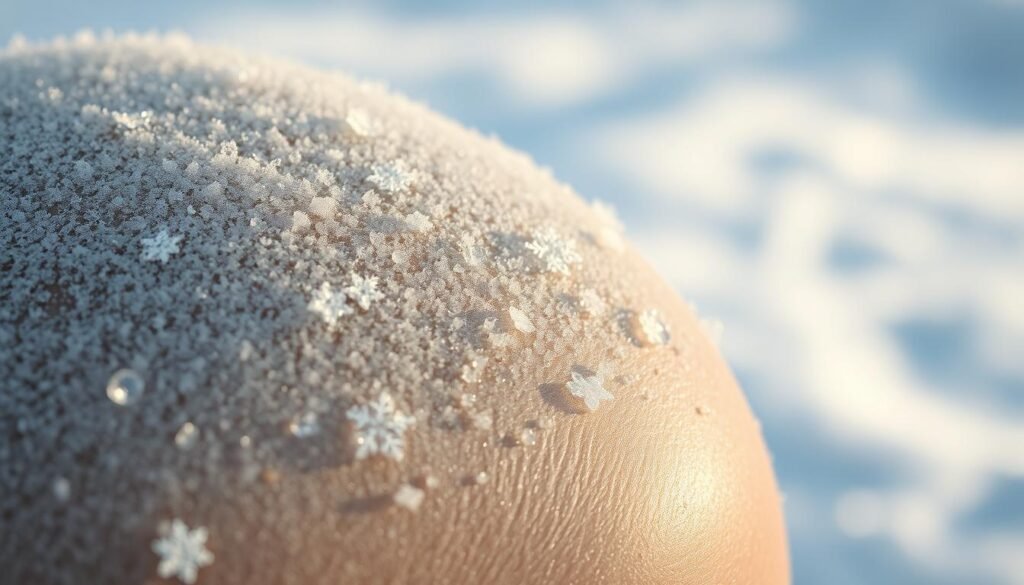Did you know that nearly 1 in every 5 people battles with dandruff? That’s 20% of the population dealing with this issue. It’s crucial to grasp how dry air plays a role in causing dandruff. When the air gets dry, especially in winter, our scalp health takes a hit.
Dry air leads to a dry scalp, causing itching, flaking, and discomfort. Changes in weather and harsh hair care products can make things worse. They add to the dandruff problem. This article will look into how dry air affects dandruff and its many causes.
If you’re seeking solutions, proper scalp hydration is key. A dedicated care routine and the right treatments can greatly help manage dandruff.
Key Takeaways
- Dandruff affects approximately 20% of the population, highlighting its prevalence.
- Environmental factors, particularly dry air, impact scalp hydration.
- Dry scalp can intensify symptoms of dandruff, leading to discomfort.
- Effective treatments include over-the-counter shampoos with key active ingredients.
- Recognizing symptoms early can lead to better management strategies.
- Consultation with a dermatologist may be necessary for severe cases.
- Regular scalp care and appropriate product choices can help maintain scalp health.
Understanding Dandruff and Its Prevalence
About half of North Americans deal with dandruff. This shows a large number of people are affected. It usually starts in puberty and might decrease as one gets older. However, some folks still face it in their later years. This means we need good ways to handle it, no matter how old we are.
When it comes to dandruff, men get it more than women. This could be because of how hormones affect oil in the scalp. Also, certain health issues and medicines might make dandruff or its severe form, seborrheic dermatitis, worse. This shows how complicated dandruff can be.
Environmental factors also play a part, mainly in winter or dry places. These situations lead to a dry scalp more often. Keeping the scalp healthy is important to stop dandruff. Dandruff might get worse at certain times, like when someone is stressed or the scalp is very oily.
- Estimates indicate 50% of North Americans suffer from dandruff.
- Men are more commonly affected than women due to hormonal influences.
- Dry scalp prevalence increases during winter and arid conditions.
- Medical conditions and medications can worsen dandruff.
What Causes Dandruff?
Dandruff has various sources that increase scalp flakiness. The main cause is the Malassezia fungus. This yeast feeds on oils made by our scalp. It then irritates skin, causing it to shed.
Many people are sensitive to this fungus. This sensitivity can cause itching and visible flakes. About half of the world’s population experiences these issues.
Cold weather also makes dandruff worse. Temperature changes like going from a hot shower to cold air can affect your scalp. This may lead to more dandruff. Wearing hats in winter can trap heat. This encourages dandruff-causing microbes to grow.
Having an oily scalp can increase dandruff, especially when stressed or tired. Hormonal changes can boost oil production. Knowing these causes helps us find better treatments and prevent dandruff. Eating foods rich in Omega-3s and greens can reduce symptoms.
For those struggling, products aimed at fighting dandruff are beneficial. Managing dandruff is about understanding and action. This includes knowing what causes it and how to react.

Dandruff stems from things like fungal activity, oil levels, and the environment. Knowing these allows for effective treatment choices. Lifestyle changes can also help manage dandruff.
| Factor | Impact |
|---|---|
| Malassezia Fungus | Increases irritation and flaking |
| Cold Weather Effects | Exacerbates symptoms due to temperature fluctuations |
| Sebum Production | Higher oil levels can worsen dandruff |
| Diet | Affects overall scalp health and dandruff severity |
| Stress | Hormonal fluctuations impact oil production |
How Dry Air Contributes to Dandruff
Dry air plays a big part in causing dandruff. When it’s cold, like in winter, there’s less moisture in the air. This makes the scalp dry. A dry scalp can lead to flaky skin.
It’s important to keep the air moist during the cold months. This helps prevent dandruff by keeping the scalp healthy.
Impact of Humidity Levels on Scalp Health
When it’s not humid, our scalps dry out more. Cold air and inside heating make this worse. Our skin gets dry and might flake off.
Keeping the air moist is key. It helps stop dandruff by keeping the scalp in good shape.
Role of Dry Scalp in Flaky Skin Production
A dry scalp makes our bodies make more skin cells. These can die and flake off. It can also itch, leading to more problems.
If you know the signs of a dry scalp, you can manage dandruff better. Staying hydrated is especially important in the cold months.

| Humidity Level | Scalp Condition | Potential Effects |
|---|---|---|
| High | Moist | Reduced dryness and flakiness |
| Normal | Balanced | Healthy scalp, minimal issues |
| Low | Dry | Increased flakiness, itchiness |
Consequences of Dry Air on Scalp Hydration
In the winter, understanding the impact of dry air on scalp moisture is key. As it gets colder, the air loses moisture, leading to more winter dandruff. This can harm scalp health, causing discomfort and symptoms that are easy to see.
How Winter Weather Affects Dandruff Severity
When it’s cold, scalp moisture decreases because humidity drops. This makes oil glands slow down, leading to more dryness. Itching and flakes may appear, similar to dry scalp signs. Many people react to oleic acid, which makes the discomfort worse. It is recommended to drink about eight glasses of water a day. This helps keep the skin hydrated, fighting dry scalp problems.
Recognizing Symptoms of Dry Scalp
It’s important to know the signs of a dry scalp for proper treatment. Symptoms include:
- Visible white flakes
- Red, irritated skin
- Itchiness
- Tightness or dryness
Dehydration can lead to these signs too, so it’s important to tell the difference between regular dandruff and true dry scalp. Using shampoos made to tackle dryness can help. They bring back moisture, which is good for the scalp. Adding conditioning treatments and a balanced hair care routine helps even more. Brushing your hair daily spreads natural oils, stopping dryness in both scalp and hair during winter.

The Link Between Sebum Production and Dandruff
It’s key to understand how sebum production and dandruff relate. An oily scalp can cause more dandruff. This is because extra oils let the Malassezia fungus grow. This fungus feeds on oleic acid from sebum. It affects nearly half the people worldwide, causing different dandruff problems.
Why Oily Scalp Leads to Increased Dandruff
People with oily scalps see more dandruff with bigger, oilier flakes. These flakes might look yellow. Changes in weather and hormones can make the scalp even oilier. This leads to more irritation and discomfort for the person. Cold or dry air can make dandruff worse, mixing oily and dry symptoms.
Stopping dandruff includes using certain products. For example, Head & Shoulders Neem shampoo deeply cleans and fights off dandruff germs. Using aloe vera or lemon juice in hair masks can also help. These natural remedies keep the scalp’s moisture in balance.
It’s vital to take care of this balance regularly. Proper care can reduce both oily and dry dandruff. Good scalp hygiene improves how you look and boosts your confidence.
| Type of Dandruff | Flake Characteristics | Causes |
|---|---|---|
| Dry Dandruff | Smaller, white flakes | Cold, dry air exposure |
| Oily Dandruff | Larger, yellow flakes | Increased sebum production |
Dandruff Treatments Available to Combat Dryness
Fighting dandruff and dry scalp needs effective treatments. These treatments range from medicines you can buy without a prescription to natural therapies. Understanding the treatments can help find the best one for your scalp care.
Shampoos Targeting Flaky Skin
Anti-dandruff shampoos are a popular choice. They contain active ingredients that fight flakes. For example, shampoos with ketoconazole, selenium sulfide, and zinc pyrithione help relieve dry scalp symptoms.
Many people find these shampoos work well. When you use them as directed, they can make your scalp healthier. It’s important to use them right to get the best results.
Home Remedies for Dandruff Relief
Some prefer natural options. Home remedies like tea tree oil and coconut oil are effective. They moisturize the scalp and reduce inflammation.
If you’re thinking about home remedies, know their possible side effects. It’s smart to talk to a doctor if your dandruff is bad. For more on natural dry scalp solutions, visit natural remedies for relief.
Adding hydration plays a key role in improving scalp health. People now prefer shampoos without sulfates and treatments based on oils. These choices are gentler but still effective.
| Treatment Type | Key Ingredients | Effectiveness |
|---|---|---|
| Anti-Dandruff Shampoos | Ketoconazole, Selenium Sulfide, Zinc Pyrithione | High relief reported among users |
| Home Remedies | Tea Tree Oil, Coconut Oil | Promising for moisture and inflammation |
Choosing the best dandruff treatment can improve your scalp health and confidence. With both medical and home remedies, you can effectively fight dryness.
Strategies for Dandruff Prevention
To prevent dandruff, it’s vital to follow key dandruff prevention strategies. These include keeping the scalp moist. Dry air, especially in winter, can make dandruff worse. Keeping your scalp hydrated is essential, using scalp care tips and the right products.
Indoor humidifiers can help by adding moisture to the air. This helps keep your scalp moist. Also, drinking lots of water is crucial for a healthy scalp and skin.
Choosing the right hair care products is also key for dandruff prevention. Use moisturizing anti-dandruff shampoos with ingredients like pyrithione zinc. They fight the microbes that cause dandruff. Use them at least three times a week for best results. Products such as Kérastase Spécifique Bain Anti-Pelliculaire and Schwarzkopf BC Scalp Genesis Anti-Dandruff Shampoo work well for different hair types.
Be mindful of how often you wash your hair. Washing too often can remove important oils. Try washing your hair two to three times a week instead. This keeps your scalp’s natural defenses strong and works well with treatment products during dandruff outbreaks.
It’s best to avoid hot water for showers as it can irritate the scalp. Also, try not to scratch your scalp. Scratching can make dandruff more noticeable. Keep using your chosen products even when the dandruff seems gone to prevent it from coming back.
| Moisturizing Techniques | Frequency/Usage | Product Examples |
|---|---|---|
| Humidifiers in living spaces | Daily | N/A |
| Hydrating the body | Consistent | N/A |
| Anti-dandruff shampoos | 3 times a week or more | Kérastase, Schwarzkopf |
| Washing frequency | 2-3 times a week | N/A |
| Follow-up treatment | 4 weeks, 3 times a week | Kérastase Spécifique Cure |
Importance of Proper Hair Care Habits
Good hair care is key to healthy hair and stopping dandruff. Choosing the right hair products is critical for scalp health. Picking wisely keeps your scalp nourished, avoiding dryness and irritation.
Choosing the Right Hair Products
To pick hair products, look for those that add moisture and nutrients. Avoid harsh chemicals as they dry out the scalp. Using gentle shampoos with moisturizing effects is a big help. Ingredients like tea tree oil and pyrithione zinc fight dandruff and keep the scalp healthy.
Knowing your hair type helps pick the right products. For example, wavy or coily hair needs special care. Avoid alcohol in styling products to prevent dryness. Hydrating creams or serums work better for adding shine and texture.
Washing your hair too much can strip it of natural oils. This may cause dryness and itching, making dandruff worse. A balanced washing routine, fitting your scalp’s needs, helps manage dandruff.
Adding good habits, like drinking water and using humidifiers, helps avoid dryness. Products such as Dove Dermacare Scalp help show how good choices benefit scalp health. A complete hair care routine, focusing on good habits, aids in keeping the scalp healthy and reducing dandruff.
Conclusion
In the winter, dry air makes dandruff worse. This is because low humidity dries out our scalp. This leads to more flakes and itching. So, finding the right dandruff treatment is key.
We can help our scalp by using natural oils and dandruff shampoos. Also, try not to take long, hot showers. Eating foods with omega-3 and vitamins will also keep your scalp healthy. For more tips on tackling dandruff in winter, check out this helpful resource.
Knowing what causes dandruff helps us fight it better. With the right care, we can keep our scalp happy in winter. If dandruff won’t go away, a dermatologist can offer bespoke help.